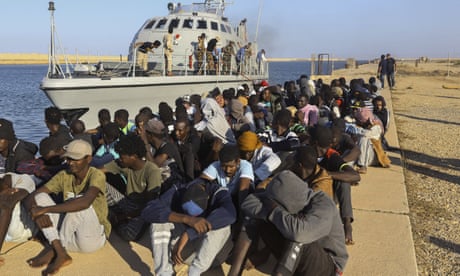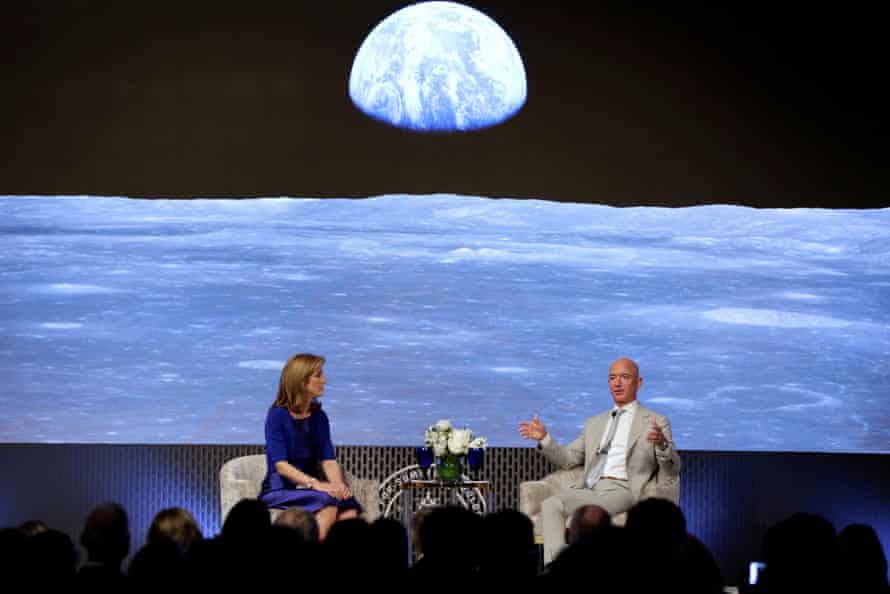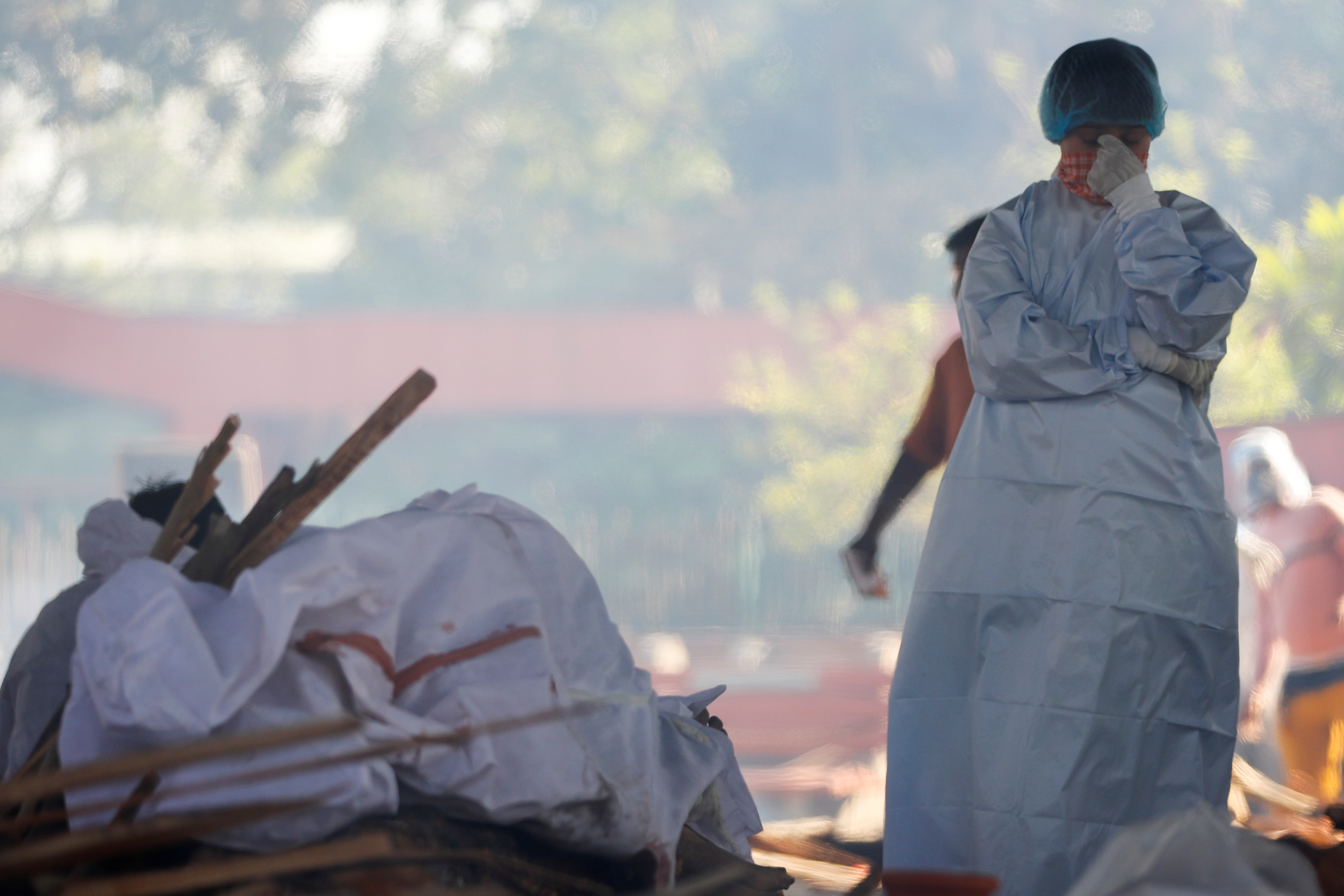A mayday call, a dash across the Mediterranean … and 130 souls lost at sea
Last week, a dinghy full of migrants sank near Libya. Those who were part of the rescue mission tell of a needless tragedy
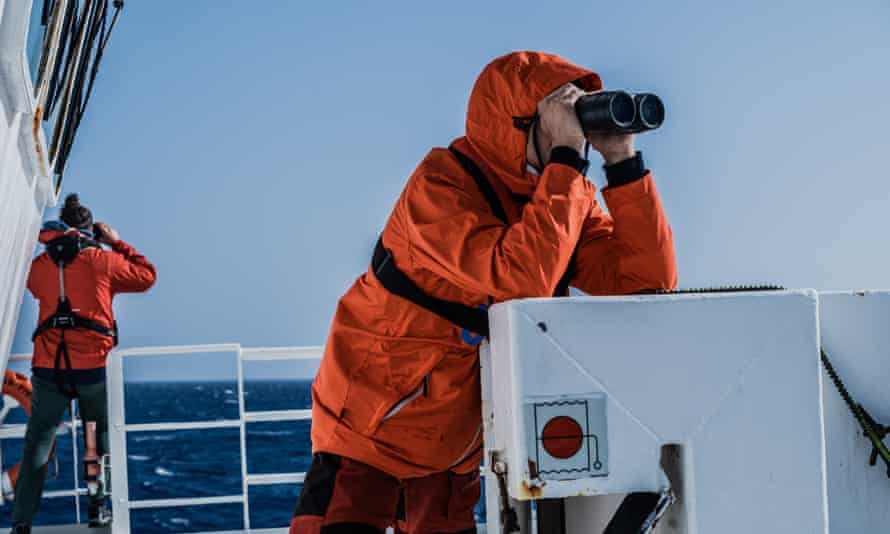
The weather was already turning when the distress call went out. A rubber dinghy with 130 people on board was adrift in the choppy Mediterranean waters.
On the bridge of the Ocean Viking, one of the only remaining NGO rescue boats operational in the Mediterranean, 121 nautical miles west, stood Luisa Albera, staring anxiously at her computer screen and then out at the rising storm and falling light at sea.
When the distress call from Alarm Phone, the volunteer-run Mediterranean rescue hotline, was received late on Wednesday, the Ocean Viking was already engaged in a rescue mission. All day the crew had been combing the horizon for another vessel, a wooden boat with 42 people on board, but so far their search had been in vain. No sign of life or position had been received since early mornin
A seasoned sailor who had already conducted dozens of rescue missions, Albera knew that time was short. A violent storm was coming, and it would take the Viking hours to reach the dinghy.
She also knew that if the they didn’t turn around, the 130 people on board would most likely be left to die. At 5.30pm, the Ocean Viking abandoned its search for the other vessel and altered its course: Albera had decided to go after the rubber boat.
“These decisions we are forced to make are life-and-death decisions,” said Albera, the search and rescue coordinator for SOS Méditerranée, the NGO that owns and operates the Ocean Viking. “It is never easy to abandon a search but we had an updated position on the dinghy and there was a chance we could make it. I have to live with these decisions every day. It’s a burden I shouldn’t have to shoulder.”
As night fell, the sea turned hostile. Two hours later, the Ocean Viking was plunging through 16ft waves towards the last known position of the dinghy. Then, the call they were dreading came. An anonymous mayday signal was received, an urgent call for all ships in the area to divert and attempt a rescue of those aboard the rubber craft. It was last located in the Libyan search and rescue (SAR) zone so Albera called the Libyan authorities to request help. They refused to confirm whether they would be assisting, or to give the Viking any updates on the dinghy’s position.
She next called the Italian Maritime Rescue Coordination Center (MRCC), and the European border agency Frontex. Neither replied.
“It’s very rare for any of the authorities in Libya or Italy to agree to help. Sometimes you can get lucky and you can catch someone who might be persuaded on a human level to provide assistance but it’s still rare,” she said.
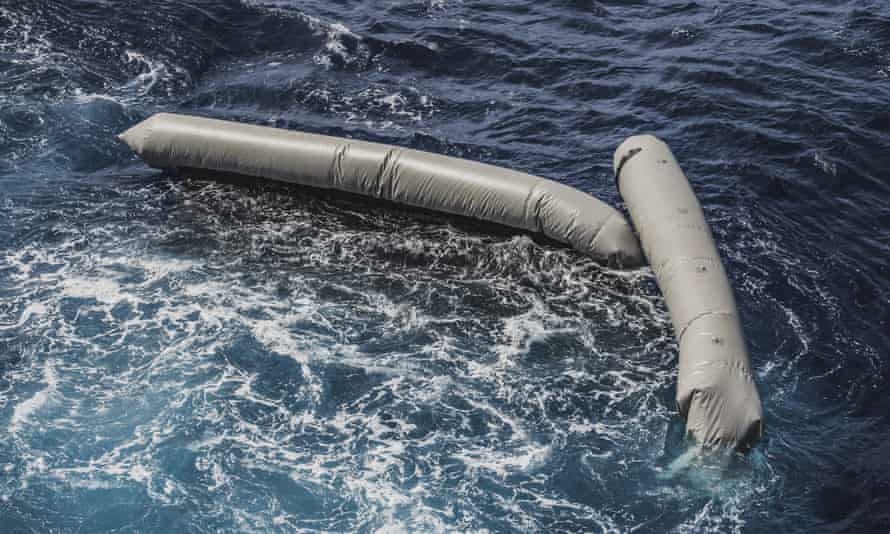
As the storm raged and lashed around them and the boat was violently tossed from side to side, below deck the medical team went through inventory checks of supplies and first-aid drills to treat multiple casualties. “We knew we wouldn’t arrive until morning. If there would be any survivors they would have been in the water for hours. They would be freezing, seasick and have hypothermia,” says Tanguy Louppe, a former soldier and firefighter turned sea rescuer and who now heads the search and rescue team on the Ocean Viking.
Yet the mood had changed aboard the Viking. Without immediate assistance, both the deteriorating weather conditions and the darkness would mean that the boat would capsize or be torn apart. The Viking continued to power through the waves, but the storm was making progress painfully slow. Every hour that went by, the chance of finding anyone alive was slipping away.
Louppe gathered the crew together and told them to prepare for a mass casualty plan. “We know we won’t be there until morning. We have to expect the worst,” he told them.
On the bridge, Albera was clinging on to hope. Three merchant boats had also responded to the mayday call. None of them would be able to carry out a rescue, but if they located the rubber dinghy they might be able to give it shelter until the Viking arrived.
At 5am on Thursday morning, the Viking finally reached the last known location of the dinghy. With no sign of any help from the Italian or Libyan authorities, the three merchant vessels had coordinated their efforts to mount a search, and once again Albera called Frontex to request aerial support to assist.
For over six hours, the four ships scoured the waves for any sign of life. Then, at 12.24pm, one of the merchant vessels radioed to say that three people had been spotted in the water. Ten minutes later, Frontex announced that it had spotted the remains of a boat.

When Albera and her crew arrived, they found a scene of desolation: an open cemetery in an otherwise breathtakingly pretty, deep blue sea.
The rubber boat hadn’t stood a chance against the fury of the storm. The deck of the boat had disappeared. Only a few grey floating buoys remained. Around them, dozens of lifeless bodies floated in the waves. The Ocean Viking, with a team of trained rescuers and medics on board, had arrived too late. Among the men, women and children they found in the water, there were no survivors.
This stretch of sea has become a morgue for thousands of people trying to reach Europe on cheap wooden boats or fragile pieces of rubber that don’t stand a chance against the elements or the political indifference that seals their fate.
Since 2014, 17,664 people have lost their lives crossing the Central Mediterranean. This week another 130 were added to the death toll.
The crew of the Viking have been through this before but the scale left them stunned. “We are heartbroken,” Albera said. “We think of the lives that have been lost and of the families who might never have certainty as to what happened to their loved ones.’’
On Friday, as news of the tragedy made headlines around the world, Frontex issued a rare statement to Italian press agency Ansa, confirming that they had issued the mayday signal and defending their response to the tragedy.
“Frontex immediately alerted national rescue centres in Italy, Malta and Libya, as required by international law,” it said.
The agency said in its statement that it had “issued several distress calls on the marine emergency radio channel to alert all vessels in the vicinity due to the critical situation and bad weather” and confirmed that it had sent out aerial support.
For Albera, the Frontex statement is an acknowledgement of the gravity of what happened that night. “This is the first time that Frontex has ever confirmed it sent a mayday because the situation was so grave,” says Albera. “They knew the boat had no chance of making it.”
Alarm Phone, who initially sent out the first alarm signal, claims it was in contact with the dinghy for over 10 hours and repeatedly relayed its GPS position and the dire situation to European and Libyan authorities and the wider public. “People could have been rescued but all authorities knowingly left them to die at sea,” it said. The United Nations migration agency also condemned the inaction. “The lack of an efficient patrolling system is undeniable and unacceptable,” Flavio Di Giacomo, Italy’s spokesman for the UN migration agency, said on Twitter. “Things need to change.”
In 2017, Europe ceded responsibility for overseeing Mediterranean rescue operations to Libya as part of a deal struck between Italy and Libya aimed at reducing migrant flows across the sea.
Since then, Libyan authorities have been accused of ignoring distress calls or intercepting dinghies and returning people to detention centres in Libya, where aid agencies say they suffer torture and abuse.
Since the start of 2018, there have been around 50 legal cases brought against NGO crew members or rescue vessels by the Italian and other European governments, and boats have been blocked in harbours or forced to remain at sea with migrants aboard.
For over 10 hours after they arrived at the wreck, Ocean Viking stayed with the bodies, waiting for instructions from the Libyan authorities. Since the dinghy sank in Libya’s search and rescue area, the responsibility for recovering those who had died fell to the Libyan MRCC (Maritime Rescue Coordination Center). If the Viking crew had tried to pull people from the water, then their entire mission may have been jeopardised. Yet no patrol boat arrived.
The decision to leave was, says Albera, traumatising for everyone on board the Viking. “It is terrible burden to have to make that choice. We waited all day for instructions [or for a patrol boat to arrive]. There was nothing more we could do for those poor people,” she says.
Since 2016, the Ocean Viking and the Aquarius, the other SOS Méditerranée vessel, have saved 32,711 lives at sea. “We have to continue our mission as this way there is a chance that we can prevent others from meeting the same fate,” says Albera. “But the decision to leave is something that all of us on board will have to live with for ever.”

